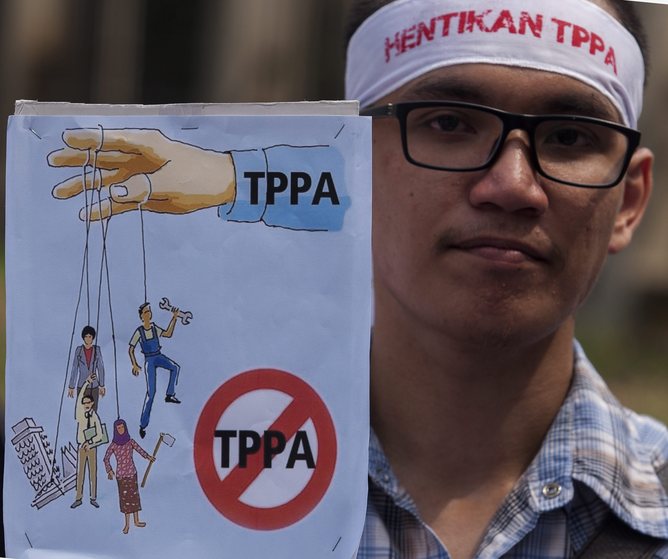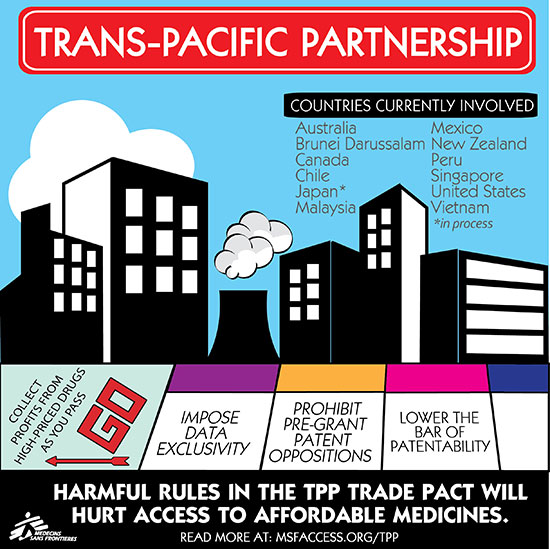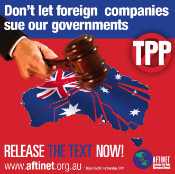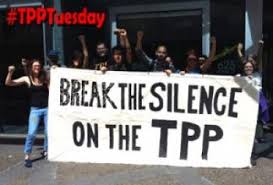Twelve countries agreed to the Trans-Pacific Partnership agreement (TPP or TPPA) in 2015. They were:
|
|
|
Reference: Deborah Gleeson, ‘What you need to know about the Trans Pacific Partnership’, The Conversation, 2 December 2013. This Partnership covers 25% of world trade and 40% of global GDP. Though the agreement is supposed to be about free trade, in fact it is about limiting the power of participating governments to have policies that foreign investors find disadvantageous. The TPP has been referred to as "NAFTA on steroids". |
 |
The benefits that were negotiated on behalf of foreign investors included:
 stment: intellectual property, permits, derivatives
stment: intellectual property, permits, derivatives Public Citizen argued that the TPP will provide incentives for sending US jobs offshore and eliminate the risks of doing so. Jobs would also be impacted by the TPP's ban on "Buy American" policies (also, of course, "Buy Australian" etc) as foreign firms would have to be treated equally.
Practically, this would mean depriving U.S. businesses of preferential access to the $1.7 trillion U.S. government procurement market in exchange for just $70 billion worth of new procurement markets for U.S. companies doing business in TPP countries.
 Foreign investors would be able to sue governments if government regulations or policies interfered with company expectations of profits using the Investor-State Dispute Settlement (ISDS) in the agreement.
Foreign investors would be able to sue governments if government regulations or policies interfered with company expectations of profits using the Investor-State Dispute Settlement (ISDS) in the agreement.
Regulations under threat include those protecting the environment, public health and financial stability. For example, governments would be limited on the safety requirements they impose on imported food. The agreement could also interfere with the ability of governments "to introduce health warnings on alcohol packaging, and the limiting of future options for food labelling".
A draft intellectual property chapter published by WikiLeaks and Fairfax Media [in 2013] detailed US proposals to make the citizens of other nations pay more for movies and software and be placed under surveillance as part of a crackdown on internet piracy. On many of those questions Australia had sided with the United States, and was sometimes the only nation to have done so.
Also negotiated as part of the agreement are benefits to transnational pharmaceutical companies that would increase the price of medicines. These include extensions to patents and restrictions on schemes such as the Australian Pharmaceutical Benefits Scheme that provides subsidies to some prescription drugs.
Negotiations [were] based on a text started prior to the financial crisis, during the George W. Bush administration, that forbids countries from maintaining or establishing certain types of regulation for financial sectors, even if such policies are applied to domestic and foreign firms alike. Forbidden would be bans on risky financial products and services (i.e. toxic derivatives and credit default swaps) and limits on the size of financial firms (i.e. prevention of "too big to fail"). The TPP also would severely limit the use of capital controls, which many nations have implemented since the crisis to stop sudden inflows and outflows of "hot money" that has destabilized entire economies.
 Negotiations were secret. The countries involved agreed not to disclose the text of the agreement until after it had been signed and the negotiating documents are to be kept secret for a further four years. There was token consultation with health and consumer representatives but they, too, were not able to view the text. A Choice petition in Australia to have the text of the agreement made public was signed by over 14,000 people.
Negotiations were secret. The countries involved agreed not to disclose the text of the agreement until after it had been signed and the negotiating documents are to be kept secret for a further four years. There was token consultation with health and consumer representatives but they, too, were not able to view the text. A Choice petition in Australia to have the text of the agreement made public was signed by over 14,000 people.
Despite widespread public calls and a resolution passed by the Senate, the [Australian] government has refused to publish the text of trade agreements before the decision to sign them is made by Cabinet. After the Cabinet decision to sign, agreements are reviewed by a parliamentary committee, but the text cannot be changed. Parliament only gets to vote on the changes to legislation required by the agreement. ISDS [Investor-State Dispute Settlement] does not require legislative change.
Although the elected representatives in each country, including the US, were unable to see the text, hundreds of US corporate "trade advisors" from corporations such as Wal-Mart and Cargill and from industry groups had full access to the text and were kept up to date with negotiations because they are members of industry trade advisory committees [ITACs].